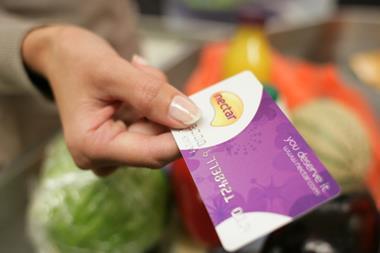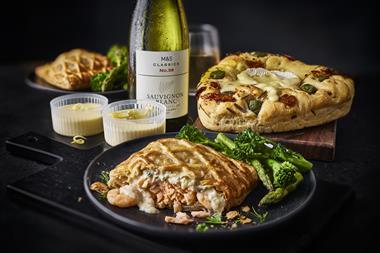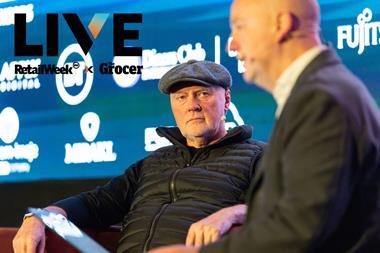Asda lost market share over the festive period, when Clubcard activity boosted Tesco’s sales. Is Asda’s attitude to such schemes changing, asks Sarah Butler
If the Christmas period offered a glimpse of things to come, then loyalty schemes could be a key battleground this year.
Tesco's heavy investment in double Clubcard points and the mail-out of cardholder vouchers in November and December was a decisive factor in increasing its market share by 0.1 percentage points to 30.5% over the festive period [Kantar Worldpanel 12w/e 24 January 2010].
Sainsbury's has also credited its Nectar loyalty card scheme for a solid performance, claiming shoppers redeemed more of their loyalty points over the festive season than ever before. And The Co-operative Group boosted its loyalty programme at the end of last year by offering a triple dividend.
But what of Asda?
The supermarket saw the slowest growth of the big four over Christmas as its market share dropped back 0.1 percentage points to 16.9% [Kantar]. Could it be that Asda is paying the price for its years of resistance to loyalty schemes, or are there mitigating circumstances for its disappointing sales performance?
Asda insists it is sticking by the mantra of chief executive Andy Bond that retailers "cannot buy loyalty with plastic points".
Yet Asda's recent publication of vouchers in national newspapers offering £5 off a £50 spend and £10 off a £100 spend and the mail-out of a gift card to consumers who had bought something from the Asda gift site suggests the retailer is concerned about promiscuous shoppers.
Indeed, after attending an Asda trade briefing this week, analyst JP Morgan noted that "while [Asda] thought loyalty was 'not a card' they acknowledged that the cards were having an impact and would do something about it."
Asda claims the February mail-out was a one-off targeted activity to get people back into stores for their big end-of-month shop following the extreme weather. The retailer adds that operating a smaller number of large out-of-town stores than its rivals meant shoppers were less able to reach its outlets during the heavy snow.
But Tesco has been quick to jump on an area of perceived weakness in its rival. "They obviously put lots of paid-for ads in the papers with money-off vouchers, and you will have seen from the Kantar data for January that their sales fell off quite a bit, so they are clearly reacting to that," says Tesco marketing director Carolyn Bradley.
The bad weather did affect Asda, says Kantar Worldpanel research director Ed Garner, as did a general consumer trend towards premium over Christmas. Rapid sales growth in Tesco's Finest range, along with the strong performance of Sainsbury's and Waitrose, suggests Asda's one-track price message failed to resonate with consumers during the indulgent festive period. Range rationalisation is also felt to have gone too far.
Asda believes the high level of promotions in the sector "clouded its every day low price image", claims JP Morgan. So what should it do next?
Garner says Tesco's two voucher mail-outs in the key trading period would have hit Asda. But it is an expensive way to buy sales. It was as if Tesco had decided to "print money for its shoppers", he says.
The Clubcard double points offer will have cost Tesco between 1% and 1.2% of sales, given that it can only be used for goods relating to about 80% of sales and excludes areas such as petrol. The cost is reduced as about 25% of Tesco's sales are carried out without a Clubcard and only about 90% of the points awarded are redeemed. That gives an estimated cost of £200m to £250m a year for the double points promotion on top of the cost of the old-style Clubcard, and before one-offs such as the Clubcard Millionaire promotion which will give five people a million points, worth £10,000. The scale of these costs show the risks involved should Asda decide to adopt a loyalty scheme.
"I don't think Asda would gain from a loyalty card," says Garner. "Loyalty cards are expensive to run and have to be funded somewhere. If it is funded by shelf-edge pricing increases then it puts enormous pressure on their raison d'etre, which is a compelling and clear price message."
Smaller stores
He argues that Asda's bigger issue is its lack of presence in smaller, more convenient stores, something Bond has promised to rectify with plans for the addition of 100 new sub-25,000 sq ft stores. In its note, JP Morgan says Asda believes 25% of the growth in the UK grocery market will come in the form of big stores, and 75% will come from smaller stores, online and non-food.
The other factor Asda must weigh up in its strategy considerations is that neither of the fastest-growing retailers, Waitrose and Morrisons, have loyalty schemes.
While Morrisons ran a six-week-long pre-Christmas promotion with a redeemable £25 voucher attached to it, like Waitrose, a strong price message for its market was combined with an emphasis on freshness and provenance. Asda's more one-dimensional price approach has limited its ability to share in shoppers' desire for better-quality food, which has returned to the fore as people have adapted to living through a recession.
"Loyalty cards are a tool and some people use them better than others," says Dave McCarthy, food retail analyst at Evolution Securities. And he suggests there are other ways retailers can ensure customer loyalty beyond card schemes.
"We haven't seen some mystical competitive advantage emanating from loyalty cards Waitrose and Morrisons have done well without one. Meanwhile, we have seen Tesco and Sainsbury's increase the payout presumably because the original payout was not enough to generate sufficient loyalty."
Weakness
He believes there is a weakness in the strategy as consumers become desensitised to loyalty programmes over time. As one senior retailer puts it: "The problem with double Green Shield Stamps was that it led to triple stamps."
As for Asda, analysts say it is dangerous to make any assumptions based on just one quarter's figures. It will only become clear if Asda's performance continues to suffer in the months ahead.
Still, loyalty promotions do seem to have played an important role in Christmas trading.
"We said in our Christmas statement that the extra reward had brought [customers] into our shops and helped them spend their money with us, so it is a big factor and it has been a big investment for us," says Bradley. Tesco will extend its double points offer for the forseeable future, she adds. "As long as customers love it and it is working for us and working for them we intend to carry on doing it."
Sainsbury's, meanwhile, plans to experiment with new techniques following an upgrade to its till systems that allows it to offer double and triple points coupons.
For its part, Asda says it has no plans to repeat last week's gift card mail-shot. It has, however, set a precedent for itself. If the experiment succeeds in bringing shoppers into stores, will the retailer be reviewing its opinion that loyalty cannot be bought?
Read more
Asda stops promotion overdose and puts the focus back on EDLP (20 February 2010)
Tesco piles loyalty pressure on Asda (13 February 2010)
Sign in to comment on this article
Not logged in before? Register for FREE guest access today.
You will be able to:
- Read more stories
- Receive daily newsletters
- Comment on stories
Advert



















No comments yet